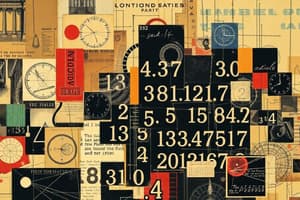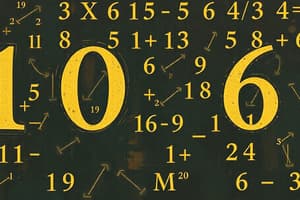Podcast
Questions and Answers
What does probability specifically deal with?
What does probability specifically deal with?
- Properties of integers and prime numbers
- Methods of reasoning and proof
- Numerical descriptions of how likely an event is to occur (correct)
- Linear equations and transformations
Which mathematical field is focused on the properties of shapes that are unchanged by continuous deformations?
Which mathematical field is focused on the properties of shapes that are unchanged by continuous deformations?
- Number theory
- Linear algebra
- Set theory
- Topology (correct)
What is a theorem?
What is a theorem?
- A statement that has been proven to be true based on prior knowledge (correct)
- A statement assumed to be true without proof
- An observation that lacks a formal argument
- A statement that cannot be expressed mathematically
Which of the following is a valid proof technique?
Which of the following is a valid proof technique?
What does mathematical modeling involve?
What does mathematical modeling involve?
Which number set includes both positive and negative values as well as zero?
Which number set includes both positive and negative values as well as zero?
What does algebra primarily use to represent unknown quantities?
What does algebra primarily use to represent unknown quantities?
What is the focus of differential calculus?
What is the focus of differential calculus?
Which of the following is a property of arithmetic operations?
Which of the following is a property of arithmetic operations?
Which geometrical concept deals with flat surfaces?
Which geometrical concept deals with flat surfaces?
What is the simplest form of a complex number?
What is the simplest form of a complex number?
Which of the following describes irrational numbers?
Which of the following describes irrational numbers?
Which branch of mathematics focuses on data collection and analysis?
Which branch of mathematics focuses on data collection and analysis?
Flashcards
Probability
Probability
Numerical description of how likely an event is to occur.
Linear Algebra
Linear Algebra
Involves linear equations and transformations.
Number Theory
Number Theory
Deals with properties of integers.
Topology
Topology
Signup and view all the flashcards
Set Theory
Set Theory
Signup and view all the flashcards
Mathematical Statements
Mathematical Statements
Signup and view all the flashcards
Proof Techniques
Proof Techniques
Signup and view all the flashcards
Deductive Reasoning
Deductive Reasoning
Signup and view all the flashcards
Theorem
Theorem
Signup and view all the flashcards
Mathematical Model
Mathematical Model
Signup and view all the flashcards
Axioms
Axioms
Signup and view all the flashcards
Natural Numbers
Natural Numbers
Signup and view all the flashcards
Whole Numbers
Whole Numbers
Signup and view all the flashcards
Integers
Integers
Signup and view all the flashcards
Rational Numbers
Rational Numbers
Signup and view all the flashcards
Irrational Numbers
Irrational Numbers
Signup and view all the flashcards
Real Numbers
Real Numbers
Signup and view all the flashcards
Complex Numbers
Complex Numbers
Signup and view all the flashcards
Addition
Addition
Signup and view all the flashcards
Subtraction
Subtraction
Signup and view all the flashcards
Multiplication
Multiplication
Signup and view all the flashcards
Division
Division
Signup and view all the flashcards
Algebra
Algebra
Signup and view all the flashcards
Geometry
Geometry
Signup and view all the flashcards
Calculus
Calculus
Signup and view all the flashcards
Differential Calculus
Differential Calculus
Signup and view all the flashcards
Integral Calculus
Integral Calculus
Signup and view all the flashcards
Study Notes
Fundamental Concepts
- Mathematics is a formal system of logic and reasoning used to study quantity, structure, space, and change.
- It encompasses a wide range of branches, each focused on specific aspects of these fundamental concepts.
- Key mathematical concepts include numbers, operations, equations, functions, geometry, and calculus.
Number Systems
- Natural numbers (counting numbers): 1, 2, 3, ...
- Whole numbers: 0, 1, 2, 3, ...
- Integers: ..., -3, -2, -1, 0, 1, 2, 3, ...
- Rational numbers: numbers that can be expressed as a fraction p/q, where p and q are integers and q is not zero.
- Irrational numbers: numbers that cannot be expressed as a fraction of two integers. Examples include π and √2.
- Real numbers: the set of all rational and irrational numbers.
- Complex numbers: numbers of the form a + bi, where a and b are real numbers and i is the imaginary unit (√-1).
Arithmetic Operations
- Addition: combining two or more quantities.
- Subtraction: finding the difference between two quantities.
- Multiplication: repeated addition of a quantity.
- Division: finding how many times one quantity is contained within another.
- Properties of operations (commutative, associative, distributive) are fundamental in algebraic manipulations.
Algebra
- Algebra uses symbols (variables) to represent unknown quantities and relationships between them.
- Solving equations and inequalities is a fundamental task in algebra.
- Functions describe relationships between variables.
- Polynomial equations and systems of equations are frequently encountered.
- Factoring is a technique for expressing a quantity as a product of factors.
Geometry
- Geometry deals with shapes, sizes, and positions of figures in space.
- Basic shapes include points, lines, angles, triangles, squares, circles, and more complex polygons.
- Euclidean geometry is a common type focused on flat surfaces.
- Non-Euclidean geometry studies curved surfaces.
Calculus
- Calculus deals with change and continuous variation.
- Differential calculus examines rates of change (derivatives).
- Integral calculus examines accumulation of quantities (integrals).
- Applications of calculus include finding slopes of curves, areas under curves, and volumes of solids.
Other Branches of Mathematics
- Discrete mathematics: deals with countable objects, like graph theory and combinatorics.
- Statistics: deals with collecting, analyzing, interpreting, and presenting data.
- Probability: deals with numerical descriptions of how likely an event is to occur.
- Linear algebra: involves linear equations and linear transformations.
- Number theory: deals with properties of integers and prime numbers.
- Topology: studies properties of shapes that are preserved under continuous deformations.
- Set theory: studies sets, which are collections of objects.
- Logic: studies methods of reasoning and proof.
Mathematical Reasoning and Proof
- Mathematical statements must be rigorously proven.
- Various proof techniques exist, including direct proof, proof by contradiction, mathematical induction, and others.
- Deductive reasoning is the process of drawing conclusions from premises.
- Theorems are statements that have been proven to be true based on axioms and prior theorems.
- Mathematical models describe systems or phenomena and are essential for problem solving and understanding.
Studying That Suits You
Use AI to generate personalized quizzes and flashcards to suit your learning preferences.




